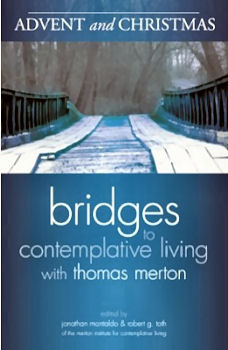
|
Posted September 30, 2010
Book: Bridges to Contemplative Living with Thomas Merton: Advent and Christmas Edited by Jonathan Montaldo and Robert G. Toth Ave Maria Press. Notre Dame, IN. 2010. Pp. 62 An Excerpt from the Jacket:
First Week of Advent: Hope Second Week of Advent: Salvation Third Week of Advent: Compassion Fourth Week of Advent: Tenderness Christmas: The Word Made Flesh An Excerpt from the Book: Merton’s Voice From Raids on the Unspeakable We live in a time of no room, which is the time of the end. The time when everyone is obsessed with lack of time, lack of space, with saving time, conquering space, projecting into time and space the anguish produced within them by the technological furies of size, volume, quantity, speed, number, price, power, and acceleration. The primordial blessing, “increase and multiply,” has suddenly become a hemorrhage of terror. We are numbered in billions and massed together, marshaled, numbered, marched here and there, taxed, drilled, armed, worked to the point of insensibility, dazed by information, drugged by entertainment, surfeited with everything, nauseated with the human race, and with ourselves, nauseated with life. As the end approaches, there is no room for nature. The cities crowd it off the face of the earth. As the end approaches, there is no room for quiet. There is no room for solitude. There is no room for thought. There is no room for attention, for the awareness of our state . . . In the time of the end there is no longer room for the desire to go on living. The time of the end is the time when men call upon the mountains to fall upon them, because they wish they did not exist. Why? Because they are part of a proliferation of life that is not fully alive, it is programmed for death. A life that has not been chosen, and can hardly be accepted, has no more room for hope. Yet it must pretend to go on hoping. It is haunted by the demon of emptiness. And out of this unutterable void come the armies, the missiles, the weapons, the bombs, the concentration camps, the race riots, the racist murders, and all the other crimes of mass society. Is this pessimism? Is this the unforgivable sin of admitting what everybody really feels? Is it pessimism to diagnose cancer as cancer? Or should one simply go on pretending that everything is getting better every day, because the time of the end is also — for some at any rate — the time of great prosperity? . . . We live in dark times, in an age of deep despair. Without an inner sense of depth and freedom we easily become oppressed by the darkness and despair, victims of our circumstances. With God, we can see and move beyond our limitations. God created us for growth, for an ever-expanding realization of the divinity within us. In God, there is true freedom. Outside of God, there is only bondage. Table of Contents: First Week of Advent: Hope Second Week of Advent: Salvation Third Week of Advent: Compassion Fourth Week of Advent: Tenderness Christmas: The Word Made Flesh |
|
